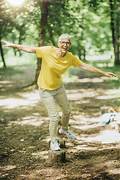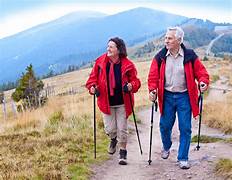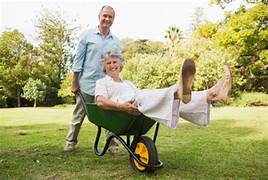Everyday Balance – Part One
All of us assume we will keep our ability to balance. Until we have a fall or get to that “age” that your balance starts to be questioned. Balance is the number one consideration we should have as we age.
However, having “good” balance is really a subjective term. What it means to one person may be something entirely different to another.
How can we define good balance?
Here is a general list of criteria to look at for “good” balance:
- If you can hold yourself on one foot (each one equally) for at least 10 counts.
- If you can reach for something on your ‘tippy toes’ and successfully get what you are after.
- Walk on icy surfaces and catch yourself if you slip.
- Almost fall and catch yourself in an action.
- Fall well without hurting yourself and get back up to continue on.
- Do not get dizzy when your head is below your heart and back up.
- Do not get disoriented or dizzy when sitting up from a lying down position.
- Changing direction on a hiking path or walking on uneven ground is easy.
- Carrying your groceries in one hand.
- Do not hold the rails up or down the stairs.
- Ability to bicycle (non electric).
What determines how good our balance is?
- Age
- Body dynamics – weight, body mass, proportions
- Health conditions – type and effects
- *Medications – type and quantity
- Hydration and electrolyte balance
- Joint replacements
- Training and conditioning
- Brain – cognition
- State of our nervous system
*Drug classes that increase the risk of falls, therefore negatively effect your balance as a side effect or direct effects are: antidepressants (SSRI’s, SNRI’s), antihistamines, anti-anxiety, blood pressure and beta blockers, heart drugs, pain drugs, diabetic drugs, sleep meds and sedatives. Also, the cumulative effect of multiple drugs increases the risk to balance control. (Harvard Med. Review, 2019)
How does Aging effect our balance?
Simply getting older does not necessarily determine balance changes. What you do about the aging does!  For instance, our muscle capability (tension, strength and reflex) decreases normally as we age. In some cases where severe illness or incapacitation for a period of time occurs, we can accelerate that process. As well, being sedentary most of the time (ie sitting in your day due to a job) will accelerate the loss of muscle in the body compared to “normal” loss due to aging.
For instance, our muscle capability (tension, strength and reflex) decreases normally as we age. In some cases where severe illness or incapacitation for a period of time occurs, we can accelerate that process. As well, being sedentary most of the time (ie sitting in your day due to a job) will accelerate the loss of muscle in the body compared to “normal” loss due to aging.
Despite all of that, risk due to balance ability is really preventable for most, and even reversible for those willing to go the extra mile.
